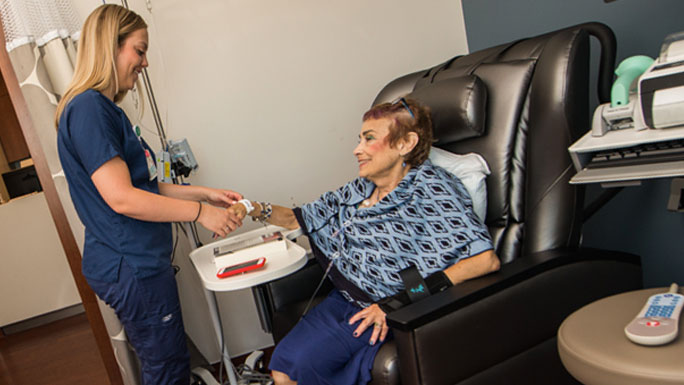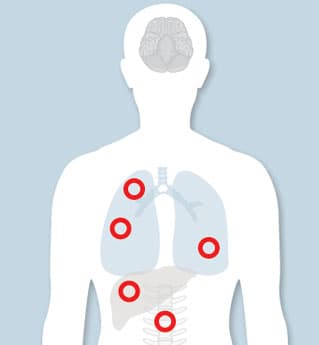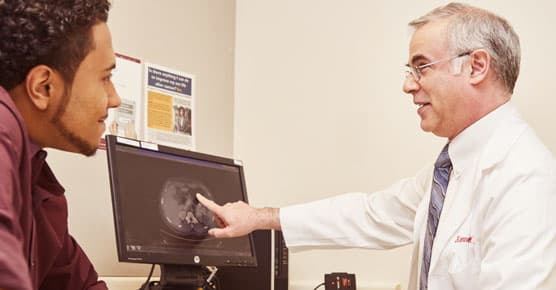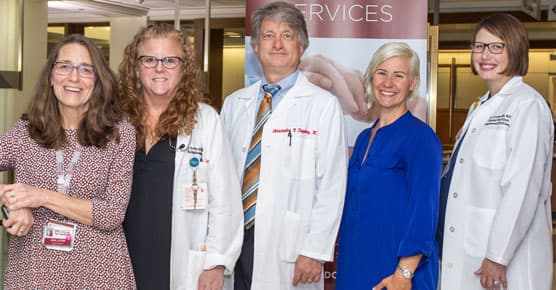Chemotherapy

For some people, the word "chemotherapy" can cause nearly as much fear as the word "cancer." But it's important to realize that chemotherapy has come a long way in recent years. Today, doctors have more medicines available to destroy cancer cells and new approaches for combining treatments to make them more effective and less disruptive to patients' lives.
Thanks to advances in genetics, the newest chemotherapy regimens are more effective — and cause fewer side effects — than previous medicines. Cancers that were once incurable can now be controlled using the latest chemotherapy drugs. These newer medicines are tailored to attack specific cancer cells — a big improvement over older medicines that couldn’t distinguish between cancer cells and healthy cells. In addition, a growing array of medicines is now available to help reduce side effects, such as nausea, infection and fatigue.
UChicago Medicine oncologists are leaders in using chemotherapy combined with the newest targeted therapies, including monoclonal antibodies. These drugs "attach" themselves to cancer cells so they cannot grow. Studies suggest these combined therapies can be effective against several types of cancer, including advanced (metastatic) disease. Our physicians are also experts in the growing field of cancer immunotherapy, which are medical treatments that help the body's immune system to seek out, recognize and attack cancer cells.
Depending on the type of cancer, chemotherapy can destroy cancer cells so they are no longer detected in the body. In other cases, these medicines can slow cancer growth and ease cancer symptoms, such as pain. Drugs like Gleevec®, known as signal transduction inhibitors, work by "turning off" specific proteins in cancer cells that cause cancer cells to grow and multiply.
Though not considered chemotherapy, anti-angiogenesis inhibitors, such as Avastin®, are sometimes given in conjunction with chemotherapy. Anti-angiogenesis inhibitors work by preventing the growth of blood vessels to the tumor, thereby starving the tumor of the blood supply it needs to grow.
The cancer team at the University of Chicago Medicine Comprehensive Cancer Center is internationally recognized for expertise in designing effective cancer treatment plans and developing clinical trials of new drugs. In fact, we are designated by the National Cancer Institute as a Comprehensive Cancer Center and offer more than 350 open cancer clinical trials. That kind of experience is essential in defining a chemotherapy treatment plan that has the best chance of success.
Your first chemotherapy treatment will be the most important for many reasons, including:
- It's easier to beat cancer in its earlier stages.
- Chemotherapy is frequently combined with other treatments, and/or given in various stages. Your first treatment will lay the foundation for any subsequent treatments that might be required.
Our oncologists realize that you may have many questions about chemotherapy — and we encourage you to ask. We will take the time to help you sort out the facts and recommend the most effective approach for your particular kind of cancer. We can also offer new drug and combination treatments before they are available at many other hospitals, making the most promising treatments available to patients who feel they may have run out of options. We also offer support programs to help you cope with chemotherapy side effects while you are undergoing treatment.
Cancer patients come to us from across the country and around the world because we are experts at designing the best possible treatment plan. However, sometimes it is appropriate for patients to pursue all or some of their chemotherapy closer to home. University of Chicago Medicine physicians and nurses can help you find a physician or hospital near your home for chemotherapy care.
Chemotherapy works by killing cancer cells throughout the body. Sometimes it may be the only cancer treatment needed. But often, it is combined with other treatments. For example, chemotherapy may be given after surgery or radiation therapy to destroy any remaining cancer in the body. This is called adjuvant therapy.
In other cases, chemotherapy may be given before surgery or radiation to help shrink a tumor prior to treatment. This is called neoadjuvant therapy.
Some chemotherapy drugs are given intravenously via tube in the vein. Others may be given by injection or taken by mouth as a pill or liquid. Some types are available as creams that you rub on your skin.
Depending on the type of chemotherapy your doctor suggests, you may need to go to the hospital or an outpatient clinic for chemotherapy. Or you may be able to take your medicine at home.
How and when you receive chemotherapy depends on a number of factors, including the medicine, the type of cancer and your health. Chemotherapy may be given every day, every week or every month. The frequency varies depending on the situation. For example, you may receive one week of chemotherapy, followed by three weeks of rest. This four-week period is considered a "cycle" of chemotherapy. You may need several cycles of treatment, depending on your condition.
The side effects of chemotherapy vary depending on the medicine and particular patient. Today, chemotherapy medicines are less toxic than older medicines. For example, they have been designed to be more "selective," so they specifically target cancer cells, not healthy cells.
However, side effects from chemotherapy can occur. The most common one is fatigue. Some of the other side effects may include:
- Nausea
- Vomiting
- Change in bowel habits
- Hair loss
- Mouth sores
- Changes in appetite
- Pain
- Low blood cell counts
Most of the time, the side effects go away after chemotherapy is completed. For example, if chemotherapy causes baldness, the hair usually grows back two to three months after the last cycle.
If you need chemotherapy, you and your cancer team can work together to help prevent or control any side effects that you may have.

Treating Metastatic Cancer with Optimism and Hope
If you have been diagnosed with metastatic cancer, more therapies may be available to you than you think. Our cancer specialists are eager to help you understand all of your options.
Limited Metastatic Cancer ProgramConvenient Locations for Cancer Care

Cancer Care Second Opinions
Request a second opinion from UChicago Medicine experts in cancer care.

Participate in a Clinical Trial
UChicago Medicine cancer experts are actively conducting clinical trials of new and promising treatments.

Helping You Cope With Cancer
Our Supportive Oncology program offers a range of services to support you and your family during your cancer treatment.
